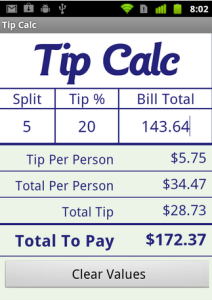Before my life as a business traveler I spent a couple of years during college waitressing. It was the most fun job I’ve had, but working as a  waitress was harder than I thought it would be. Lifting heavy trays of food, meeting everybody’s demands, smiling when I would rather not, and many other challenges contributed to pure exhaustion at times. Ever since, I have always taken care of servers when dining out.
waitress was harder than I thought it would be. Lifting heavy trays of food, meeting everybody’s demands, smiling when I would rather not, and many other challenges contributed to pure exhaustion at times. Ever since, I have always taken care of servers when dining out.
A recent article from CNN discusses restaurants that are moving away from tipping and instead raising menu prices to help compensate their employees. The idea behind this is to be more like other industries where employees don’t rely on customer tipping for the majority of their pay. The restaurant example used in the story said they raised menus prices by 20% then either paid wait staff $10 and hour or 20% of sales (whichever was the higher of the two). He built tax and gratuity into his menu prices when he opened the restaurant at the start of 2014. The owner said his wait staff earns on average $16.50 an hour.
If every restaurant paid their wait staff either a minimum of $10 an hour or 20% of sales (again, whichever is higher) I could see the no-tipping policy making some of waitstaff happy, especially if their overall pay increases. However, I really think it depends on the type of establishment. I worked at a high-end barbeque restaurant (it’s Texas, after all) and for a four hour shift some of the top servers made over $100 a night during the week and upwards of $200 per night on the weekend. So obviously those servers wouldn’t be thrilled to make $10-15 per hour. Not to mention, I don’t believe every restaurant is going to be as generous as the one given as the example in the story. But my biggest concern is quality of service. I’ve been to restaurants that have no-tipping policies and there is a huge difference in the level of service customers receive. Of course, I would guess that most waiters don’t make as much as my friends from college—plus not everyone tips well, so including server compensation in food prices would protect those servers.
When I travel for business one of my favorite things is going out to a nice restaurant to enjoy local food, and getting great service after a long difficult day. I also love to tip generously as long as the service is good because I know how hard that job can be. So while I will continue to tip generously, I will also watch closely to see where this discussion leads. One of the people quoted in the article predicts that this will be the big debate of 2015. We shall see!
Readers, what are your thoughts on tipping vs. increasing food prices and paying a “living wage”?
****************************************************************************
Be sure to check out my page with products I recommend for travel!
Have a travel question or suggestion? Send it to RW @RoadWarriorette.com.
Follow Road Warriorette on Twitter, Facebook, and Pinterest!
This post may include affiliate links. Thanks for your support!



On the topic of tipping although not how restaurants pay staff – I had a project manager take the team out to dinner. Then as we were walking out the door, she mentioned that she did not leave a tip because (really stupid reason). I was shocked, and I would have left a tip myself if I knew she planned not to. I still feel bad about it.
I’ve talked with a lot of people I know that live on tips. Although they’ll complain about a low/no tipper, they don’t feel they would ever be paid at an hourly level that would make up for a no tipping policy. Plus they’d have to pay tax on it all.
Of course going the no tipping route is a benefit to those that provide the poorer service (hence lower tips).
It will be a hard sell here in the US. I have been to countries in Europe where tipping is virtually nonexistent (Italy) to minimal (France) to half what it is here (Ireland). The wait staff are paid a living wage and waitering is a job you can do for a career. But here, it’s just become so ingrained in the culture that I can’t see it changing any time soon.
No tipping should be made standard.
I’ve been to many mid level establishments and several high level (not fine dining michelin restaurants) where tips are high and service is poor. If one has to ask for a tip instead of being paid per your experience and performance review, then there would be no salaried people. A bonus payment is the responsibility of the employer, not the paying customer. Ban tipping. It is one of the worst inventions that Americans have helped propagate.
People would still feel responsible to tip here in the US. Coupled with higher prices would be a mess. What is it with tip lines on bills for takeout now? Does anybody else notice this? If you order for pick up, the bill you sign at the cashier now has a tip line (at many restaurants). It’s becoming the norm for hosts/hostesses/cashiers to expect/anticipate some kind of tip for ringing you up. I see people all the time now giving these cashiers $1 or $2 just because the tip line is there. This was not prevalent years ago. I understand if staff is walking out to your car because you parked in the pick up parking space but otherwise….
I think that waiters should be paid and given raises the same way retail industry gets paid and raised. There should be upward mobility. There’s no way someone should be making 50/hr for 4 hours of waiting.
No tipping. Its ridiculous. Most of the world does not tip. Most of the world either provides good service because they take pride in what they do and they want you to COME BACK. I’d rather all eating establish raise prices by 20% and just pay their waitstaff.
When I waitressed in/after college, I would make $100-$120 on a weekend 5 hour shift – and that was serving pizza/beer. Sadly, no one will ever agree what a fair wage is for servers – I have friends who make a great living as full time servers – if they got $10-15/hour they’d quit. In the US, our entire culture pretty much has their hand out for a tip – the takeout window? I worked takeout for years without a tip, I got paid the regular wage for that vs. my $2.01/hour for tipped employees. If the wage were passed to the customer, I wonder if the US obesity rate would decline when the delivery pizza now costs $20 instead of $10!
Agree that tipping is an arcane feudal custom that needs to be abolished. It’s a transfer of,the cost of wages from the employer to the customer. And nobody should have to rely on the good grace of strangers to be properly compensated. Pay employees a fair wage and raise prices to reflect the true cost of your product.
And btw there is no correlation between tipping and quality. There is no tipping in much of Asia and services is far better.
My daughter worked as a server for years as went through college and graduate school, eventually earning her doctorate. She loved it, and feels it’s the only way to go.
Servers who work for tips are motivated to learn and innovate, to manage time and effort and work efficiently, and to give the best service to the most customers.
Servers make more money than they’d ever make in wages. Customers get better service than they hope for from a mere “professional.” The restaurant runs more efficiently and profitably. Servers and customers have more fun. Everyone benefits.
There is an absolute correlation between tipping and quality in the U.S. Raising prices to include tip will crush your takeaway business. Keeping prices the same and force adding tipping at the table really depends on the individual business, and could benefit or harm depending on how well it is managed and communicated.
Ever get home and realize you tipped on top of a tip(say ‘18% for parties of 6 or more’ for example).
Really depends on local culture.
Another issue with the present system is the imbalance in pay between servers and cooks. I would guess that the average cook pay is $10-$15 p/h whereas servers & bartenders is more like $20-$25. By including tips in the menu price it would leave the owner able to distribute the income more fairly, all that being said I don’t think things will change anytime soon.
I live in a no-tipping country. Usually we tip anyway, rounding up 5-10% of the bill depending on whether a) we were happy with the food and b) we were happy with the service. Most restaurants here pool tips and split them between the entire staff, so it seems fairer to me. If it’s good, they get a bonus, so it’s in everyone’s interest to get it right. I never reward bad service. I also usually tip cabbies if they haven’t dicked around taking the long way (and these days, you can really tell, with GPS on your phone).
I have refused to tip in the US once, but it was a driver service which was pre-paid, though I knew I would be expected to tip at the hotel destination. When I was safely out of that death-machine, I told him that I was not tipping him because I was terrified for the entire journey (through torrential rain, with the wipers mostly off, and him braking when he was only two feet from the car in front on the motorway etc). He just shrugged as if I was perfectly justified to refuse!
I find tipping in the US confusing. I’m never sure whether to tip a doorman, for instance, and for the same reason, most Aussies I’ve mentioned this to refuse to have someone bring their bags to their room (or even accompany them) because they are unsure if a tip is expected, or how much (guide books are infuriatingly vague about these things). But worse is the etiquette outside the US, eg Canada, where people do get a living wage. And places like Hong Kong, where people can easily mistake you for an American and be disappointed when they don’t get a tip! It’s a nightmare.